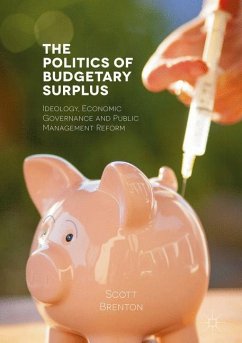This book probes the hollow rhetoric of debt, deficits and austerity. It explores the decisions of parties of the left which have attempted to deflect criticisms of economic mismanagement and gain trust by depoliticising the budget process and financial management with various rules, albeit with elements of discretion. The book argues that this is a perverse form of trust as it is premised on the belief that political leaders and the public sector cannot be trusted to make appropriate decisions given the economic circumstances of the time and need rules, but at the same time that they can be trusted to follow the rules. The book also explores parties of the right, which often advocate stricter rules and which tend to be the least effective. The book describes how few conservative governments have admirable records on sustained surpluses, given a propensity for unsustainable tax cuts, and the future opportunities this provides to advance a political program of deeper spending cuts.
Bitte wählen Sie Ihr Anliegen aus.
Rechnungen
Retourenschein anfordern
Bestellstatus
Storno








